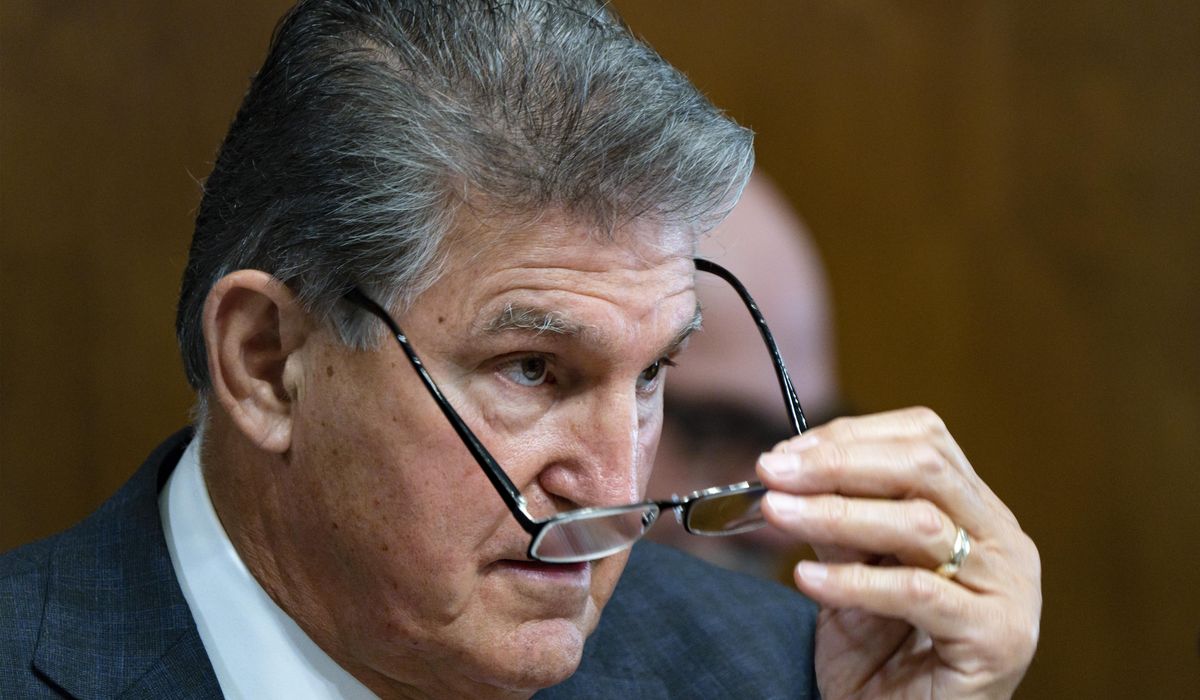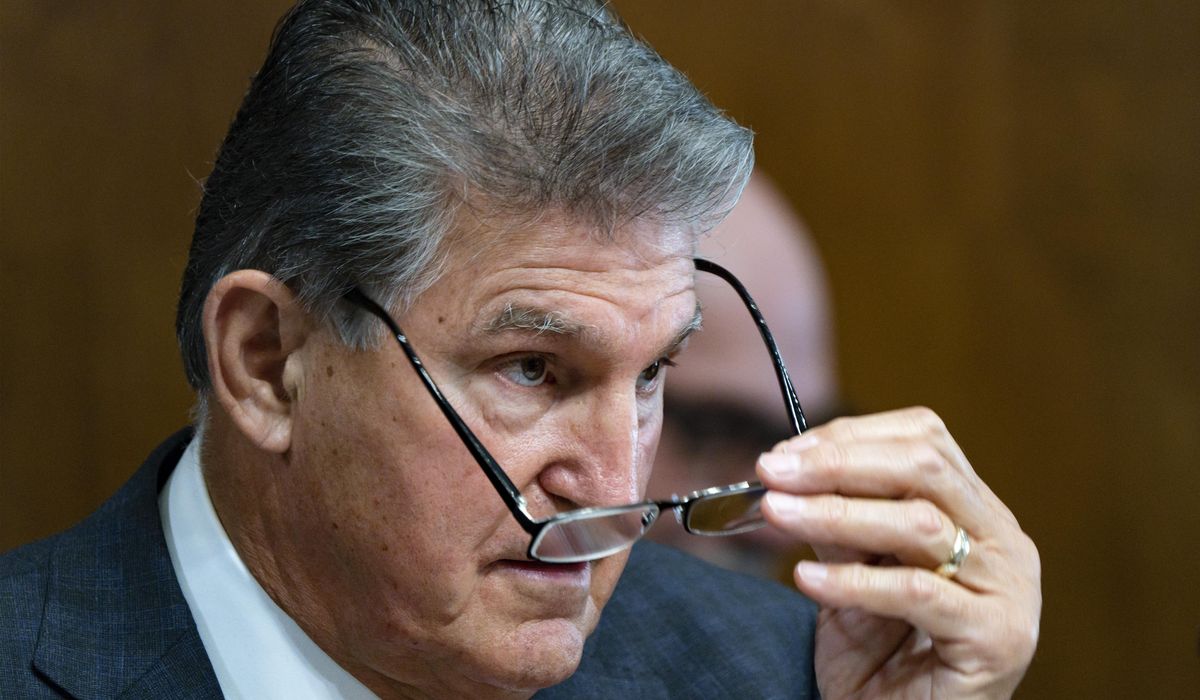
President Biden hosted Sen. Joe Manchin III of West Virginia, a key swing vote for his legislative agenda, in Delaware on Sunday as Democrats weighed a billionaire’s tax to help pay for their multitrillion-dollar expansion of the federal safety net.
Mr. Biden met with Mr. Manchin and Senate Majority Leader Charles E. Schumer, New York Democrat, at the president’s Delaware home for a wide-ranging discussion on the spending plan. Democrats have become increasingly optimistic that a deal is at hand.
“We have 90% of the bill agreed to and written. We just have some of the last decisions to be made,” House Speaker Nancy Pelosi, California Democrat, said on CNN’s “State of the Union.” “It is less than what it was projected to begin with, but it is still bigger than anything we have ever done in terms of addressing the needs of America’s working families.”
Congressional Democrats are weighing a new tax on the incomes and assets of the nation’s billionaires. Many believe the provision can help get the spending package across the finish line.
Senate Finance Committee Chairman Ron Wyden, Oregon Democrat, is drafting the proposal with input from the White House and congressional leadership. Democrats hope the plan will raise sufficient revenue to fund the more than $2 trillion in spending they are proposing.
Although details haven’t been finalized, the provision would tax billionaires annually on any increase in the value of their assets, including stocks and real estate. The tax would apply to people with assets in the billion-dollar range and those with annual incomes greater than $100 million over three years.
“The billionaires’ income tax is about fairness and showing the American people taxes aren’t mandatory for them and optional for the wealthiest people in the country,” Mr. Wyden said.
Unlike the capital gains tax, which comes from the profit of the sale of an asset, the surcharge would be assessed annually regardless of whether the asset is sold. Individuals would be eligible for tax deductions, however, if their assets lose value over the span of a year.
Democrats say the tax would help ensure that everyone pays their fair share. They say billionaires have manipulated the tax code by sitting on assets while using them as collateral for loans to finance jet-setting lifestyles.
Not everyone is on board with the proposal. Opponents say the tax would be complicated to implement and could result in more asset offshoring. Instead, they say, Mr. Biden should stick with his proposal to hike the income tax on top earners and corporations.
“When you do rates, they’re efficient and they’re easily implemented. Unlike the more esoteric ideas of taxing this or taxing that, rates are simple by nature,” said House Ways and Means Committee Chairman Richard E. Neal, Massachusetts Democrat. “People understand them.”
Democrats are also considering other revenue measures to pay for Mr. Biden’s domestic ambitions.
Up for consideration is a 15% global minimum tax on corporations, which would apply to overseas profits. Mr. Biden is also eager to expand IRS enforcement measures to crack down on tax scofflaws. Part of the expansion entails giving the IRS bank information on accounts with more than $10,000 in annual deposits or withdrawals.
Democrats say a deal on the tax increases would go a long way toward finalizing the package. Mr. Schumer hoped to have it completed by Friday.
Given that Democrats plan to push the spending bill through the Senate, split 50-50 along party lines, the opposition effectively killed the tax increases. Mr. Biden will need the support of Mr. Manchin and another key moderate Democrat, Sen. Kyrsten Sinema of Arizona.
Mr. Biden initially wanted the bill to run upward of $3.5 trillion and include long-sought liberal priorities such as free community college, amnesty for illegal immigrants and more climate change regulations.
After Mr. Manchin and Ms. Sinema opposed the spending package, the White House was forced to retreat.
Mr. Biden has scaled back the price tag from $3.5 trillion to $2.2 trillion. Some Democrats estimate the ultimate figure to be as low as $1.75 trillion.
“I’m very optimistic,” said Mrs. Pelosi. “This is exciting because whatever it is, it’s going to be bigger than anything we’ve ever done for the American people.”
Dropped by the wayside has been Mr. Biden’s proposal to grant two free years of community college, regardless of citizenship. Also out is a tax credit scheme that many hoped would force electric utility companies to abandon coal and natural gas in favor of wind and solar power.
The deal still includes $450 billion for a universal pre-kindergarten program. Money is also earmarked for transitioning the federal fleet of vehicles to electricity. A further $3.5 billion would be spent on creating a “civilian climate corps” program to employ youths to plant trees.
Although they have a broad consensus on certain programs, Democrats have yet to hash out a large portion of the package.
Democrats are deeply divided over whether to means test and make the child tax credit permanent. They also disagree about the number of weeks of paid family leave for employees and the extent of health care provisions, including Medicare and Medicaid expansion.
The fate of such programs, lawmakers say, will be clearer once they determine a top-line price for the spending package. For that to happen, Democrats need to ensure sufficient federal funding is available.
“We agree on the policy outcomes. Now we just have to find a path on the revenues side,” said Mr. Neal. “This is the ninth inning.”
House Democrats initially proposed at least 40 new tax increases, including higher taxes on corporations and a doubling of the federal tobacco tax, to pay for the programs.
Ms. Sinema upset that plan by opposing tax hikes for corporations and top earners.
“She has told her colleagues and the president that simply raising tax rates will not in any way address the challenge of tax avoidance or improve economic competitiveness,” said John LaBombard, a spokesman for Ms. Sinema.
In private conversations, though, Democrats say Ms. Sinema is increasingly open to the billionaires’ income tax.
Democratic leaders are optimistic about the state of the negotiations.
House Majority Leader Steny H. Hoyer, Maryland Democrat, expressed hope that some version of the spending bill would be brought up for debate this week.








